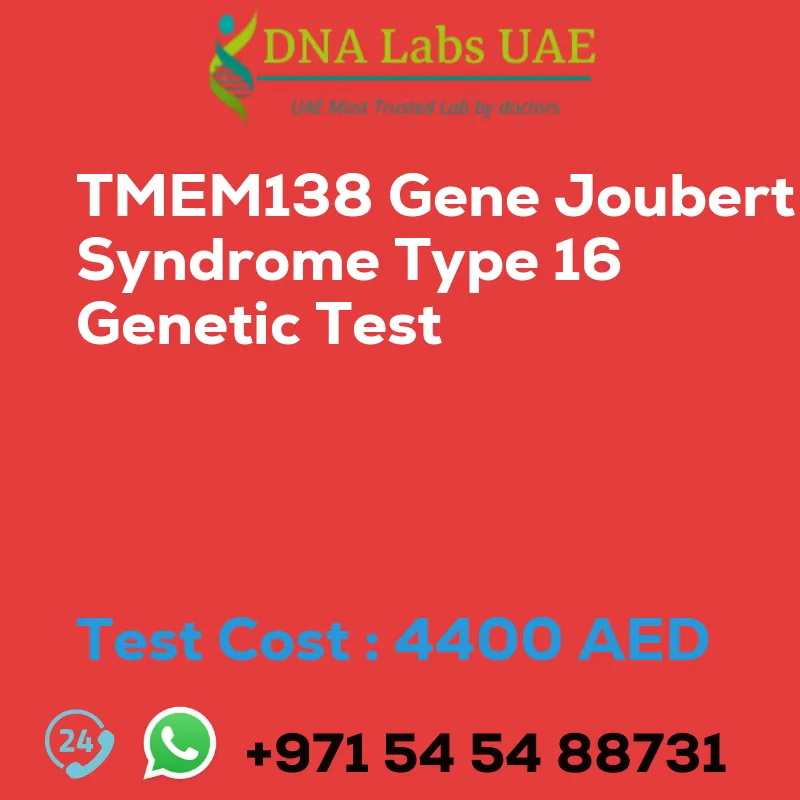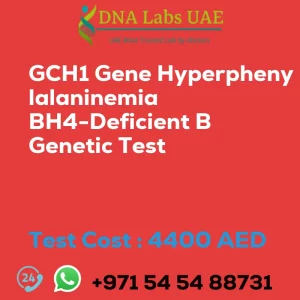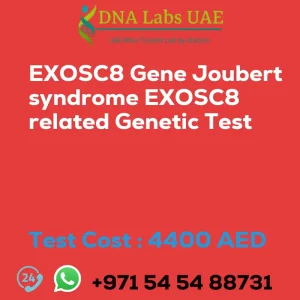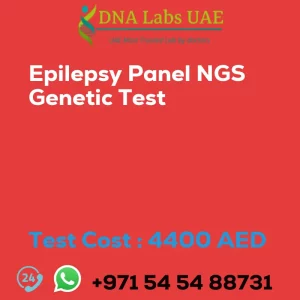TMEM138 Gene Joubert Syndrome Type 16 Genetic Test
Test Name: TMEM138 Gene Joubert Syndrome Type 16 Genetic Test
Components: Blood or Extracted DNA or One drop Blood on FTA Card
Price: 4400.0 AED
Sample Condition: Blood or Extracted DNA or One drop Blood on FTA Card
Report Delivery: 3 to 4 Weeks
Method: NGS Technology
Test Type: Neurological Disorders
Doctor: Neurologist
Test Department: Genetics
Pre Test Information: Clinical History of Patient who is going for TMEM138 Gene Joubert Syndrome Type 16 NGS Genetic DNA Test. A Genetic Counselling session to draw a pedigree chart of family members affected with TMEM138 Gene Joubert Syndrome Type 16.
Test Details
The TMEM138 gene is associated with Joubert syndrome type 16. Joubert syndrome is a rare genetic disorder characterized by a specific brain abnormality called the “molar tooth sign” and a range of symptoms including developmental delay, breathing abnormalities, abnormal eye movements, and kidney abnormalities.
NGS (Next-Generation Sequencing) genetic testing is a type of genetic testing that allows for the rapid and comprehensive analysis of multiple genes simultaneously. It can be used to identify mutations or variations in the TMEM138 gene or other genes associated with Joubert syndrome type 16.
By analyzing the DNA sequence of the TMEM138 gene, NGS genetic testing can detect any mutations or variations that may be present. This information can be used for diagnostic purposes, to confirm a suspected diagnosis of Joubert syndrome type 16, and to provide information about the specific genetic variant causing the condition.
NGS genetic testing can also be used for carrier testing, to identify individuals who carry a mutation in the TMEM138 gene but do not have symptoms of Joubert syndrome themselves. This information can be useful for family planning and genetic counseling.
It is important to note that genetic testing should be performed and interpreted by a qualified healthcare professional or genetic counselor. They can provide guidance on the appropriateness of testing, the potential risks and benefits, and the implications of the test results.
| Test Name | TMEM138 Gene Joubert syndrome type 16 Genetic Test |
|---|---|
| Components | |
| Price | 4400.0 AED |
| Sample Condition | Blood or Extracted DNA or One drop Blood on FTA Card o |
| Report Delivery | 3 to 4 Weeks |
| Method | NGS Technology |
| Test type | Neurological Disorders |
| Doctor | Neurologist |
| Test Department: | Genetics |
| Pre Test Information | Clinical History of Patient who is going for TMEM138 Gene Joubert syndrome type 16 NGS Genetic DNA Test A Genetic Counselling session to draw a pedigree chart of family members affected with TMEM138 Gene Joubert syndrome type 16 |
| Test Details |
The TMEM138 gene is associated with Joubert syndrome type 16. Joubert syndrome is a rare genetic disorder characterized by a specific brain abnormality called the “molar tooth sign” and a range of symptoms including developmental delay, breathing abnormalities, abnormal eye movements, and kidney abnormalities. NGS (Next-Generation Sequencing) genetic testing is a type of genetic testing that allows for the rapid and comprehensive analysis of multiple genes simultaneously. It can be used to identify mutations or variations in the TMEM138 gene or other genes associated with Joubert syndrome type 16. By analyzing the DNA sequence of the TMEM138 gene, NGS genetic testing can detect any mutations or variations that may be present. This information can be used for diagnostic purposes, to confirm a suspected diagnosis of Joubert syndrome type 16, and to provide information about the specific genetic variant causing the condition. NGS genetic testing can also be used for carrier testing, to identify individuals who carry a mutation in the TMEM138 gene but do not have symptoms of Joubert syndrome themselves. This information can be useful for family planning and genetic counseling. It is important to note that genetic testing should be performed and interpreted by a qualified healthcare professional or genetic counselor. They can provide guidance on the appropriateness of testing, the potential risks and benefits, and the implications of the test results. |








